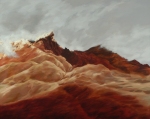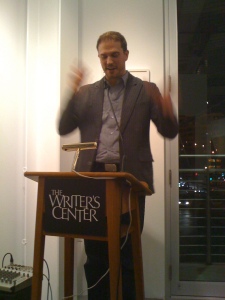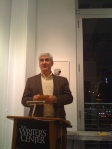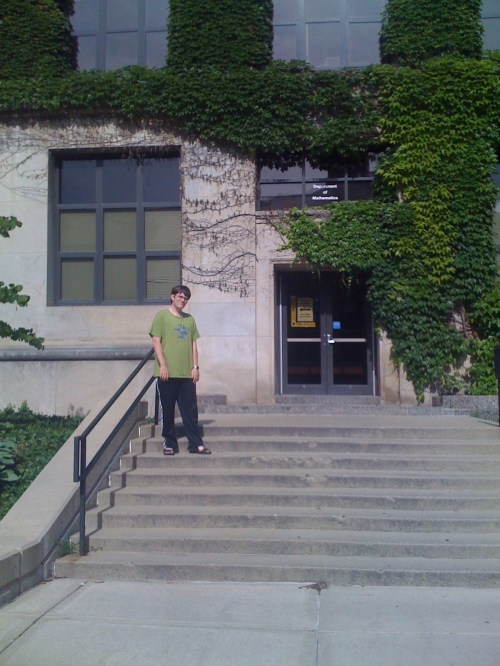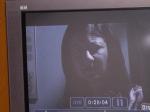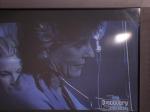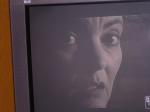
Veins, Sheboygan County, Wisconsin, October 2009, all photos
© 2009 by QuoinMonkey. All rights reserved.
Day to day life creeps up on you. Practice falls by the wayside. Goals seem out of reach. Something inside makes you keep going.
Early October was my second time in Sheboygan County, Wisconsin to meet with three other Midwest writers in retreat. We arrived on Sunday, left on Wednesday, but we sure packed in the writing. I nearly filled an entire notebook. We try to meet every 6 months. The first night, we check in, slip sheets on the cabin beds, walk by Lake Michigan, get all the gossip and gabbing out of the way. The next day we dive in.

It’s cold this time of year. One person becomes the Firekeeper. The wood pile needs to be replenished. The fire keeps us warm. There is a need for leadership, someone to time the Writing Practices, lead the slow walking, provide structure for the silence — a Timekeeper. Most traditions have a Firekeeper and a Timekeeper. I am grateful for their effort.
Before the writing begins, we tear off pages of a lined yellow tablet, jot down Writing Topics, and throw them into a bowl. We take turns choosing a Topic and rotate who reads first. Some of the best Writing Practices surface from the strangest Writing Topics. My Other Self. Holy-Moley. The Broken Glass. After a few years of meeting, we have settled into a groove. I trust these writers.
One of the Writing Topics we drew out of the bowl was “I Write Because…” When the retreat was over, I asked  everyone if they would mind if I published the practices. For me, they harken back to the days when ybonesy and I first launched red Ravine (it grew out of our practice). And she has written with these writers, too. Bob and Teri have been frequent guests on red Ravine. Jude was one of our first guests, writing her piece 25 Reasons I Write from one of the cabins near the lake.
everyone if they would mind if I published the practices. For me, they harken back to the days when ybonesy and I first launched red Ravine (it grew out of our practice). And she has written with these writers, too. Bob and Teri have been frequent guests on red Ravine. Jude was one of our first guests, writing her piece 25 Reasons I Write from one of the cabins near the lake.
I want to share the structure of our writing retreats because anyone can form a writing group. Community is important. For the four of us, meeting together works because we live in fairly close proximity in the Midwest. We can make the drive in 8 to 10 hours if we want to. Last time, Teri, Jude, and I flew to Kansas City, Missouri. We’re thinking about meeting in Duluth, Minnesota on Lake Superior in 6 months.
 I don’t want to make it sound easy. It takes a financial investment up front. And a continued commitment to check in with each other and plan the next meeting at least 3 months ahead. But the rewards are plentiful. Accountability. Support. People who believe in me when I forget how to believe in myself. Some days it feels like our hands are going to fall off from the writing. We crave the silence.
I don’t want to make it sound easy. It takes a financial investment up front. And a continued commitment to check in with each other and plan the next meeting at least 3 months ahead. But the rewards are plentiful. Accountability. Support. People who believe in me when I forget how to believe in myself. Some days it feels like our hands are going to fall off from the writing. We crave the silence.
We laugh long and hard. Deep belly laughs. Sometimes we cry. It feels good to laugh like that, to share meals together. Teri brings wild rice soup from Minnesota. Bob travels with a different kind of Kansas City barbecue each time we meet. Jude prepares her favorite dishes. I don’t like to cook. I volunteer to do the dishes.
 The Timekeeper sent me a rundown of our schedule. It works pretty much the same way each time we meet. We follow what we learned from Natalie Goldberg about silence and structure and Writing Practice. Sit, walk, write. We do it because we don’t want to be tossed away. We do it because, for us, it works. It’s one way to write. It teaches discipline. It’s solid. It takes us where we need to go.
The Timekeeper sent me a rundown of our schedule. It works pretty much the same way each time we meet. We follow what we learned from Natalie Goldberg about silence and structure and Writing Practice. Sit, walk, write. We do it because we don’t want to be tossed away. We do it because, for us, it works. It’s one way to write. It teaches discipline. It’s solid. It takes us where we need to go.
_____________________________
Writing Retreat Schedule
Wake up. Silence begins.
Meet for sit, walk, write at 9 a.m.
Sit for 20 minutes.
Walk for 5-10 minutes.
Write: four, 10-minute Writing Practices…one right after the other.
Read one practice, go around the group.
Repeat for the remaining three practices.
Break for 5-10 minutes. (Can break before reading, but usually break after reading)
Return to group.
Write two more practices.
Read them to each other.
About 11:30, break for lunch. Some prep required and we ate lunch in silence.
In silence and on our own until 3 p.m. when we return to the group.
Sit for 20 minutes.
Walk for 5-10 minutes.
Write: four, 10-minute writing practices.
Read each practice write to the group.
Break for dinner about 5:30 p.m.
Break silence.
Dinner at 6.
Talking about writing, life, etc.
Read writing projects we are working on.
Second Day
Repeat of the first day.
Third/Last Day
Meet for discussion of goals for next 6 months.
Sit for 10 minutes.
Then take 1/2 hour or 45 minutes to formulate writing/creative goals for the next 6 months.
Meet in group.
Each person discusses goals.
Group comments and person refines goals.
Each member of the group emails their goals to one person who puts them all together, sends them out for review, and then issues final email to group with all the goals listed.
Report to each other on 15th of the month and the last day of the month on our progress…a check-in.
_____________________________

What I really want to say is I’m grateful for other writers. I admire and respect those who hone their craft, who dedicate time to their practice, who complete projects and get their work out there (no matter how long it takes).
For me, these self-propelled mini-retreats work because:
- Follow the same Sit, Walk, Write structure each time. Consistent format.
- Time to talk, laugh, share. Time for silence. Time alone for reflection. Time to stare into space.
- No shame, no blame. We write our asses off, we read aloud. No crosstalk or feedback (except around goals).
- Set 6 month goals, check in every two weeks. Learn that we all go through highs and lows; we all want to quit writing at times.
- Clarity about money. Split the costs of lodging and groceries.
- Short visits to museums, cafes, local color, either before or after retreat.
- Practice feeds practice. Apply what is learned to other practices: photography, haiku, poetry, art.
- What happens at the retreat, stays at the retreat.
Maybe Bob, Jude, and Teri will share more about why these mini-retreats work for them. I was reading through my notebook from early October. There were notes I had jotted in the margins from a conversation we had about what success as a writer means to each of us. What does success mean to you?
What would your writing retreat look like? Go for it. Choose a time. Hook up with other writers. Create a structure. Write. Don’t look for perfection. Let yourself slip up, make mistakes, stop writing for a while if you want to. But don’t be tossed away. Here are our unedited Writing Practices on why we write. Why do you write?
I Write Because…10 minutes. Go!
____________________
Teri Blair
I don’t know why I write anymore. That’s the problem. I used to write because I needed to. That was most of my life. Most of my life until I took a sabbatical six years ago. Until then, I found solace on the page; I straightened out my life with a pen and paper. Writing was one of my best friends…certainly a most faithful friend.
And then, I took the sabbatical and began this journey. This concentrate-on-writing-journey. It went well initially. I let myself write all those essays, I joined the Blue Mooners writing group, I studied with Natalie Goldberg, and I starting working with Scott. I sent my work out and even got some small paychecks from editors. But somewhere in there, during these six years, it changed. People started asking me if I had sold anything, asking me about writing all the time. I wanted them to ask me, and then I didn’t. I was losing something by involving everyone, and then it just turned into a pressure. I was writing to have an answer to their questions. Or to feel special. When this was dawning on me, I went to hear Mary Oliver at the State Theater. She told the writers in the audience to write a long, long time before they tried to publish. I knew she was right. I knew I had to go back inside myself if I was going to save this thing that I had once loved and needed and felt close to.
The trip out of the pressure has been much more difficult than the joy-ride in. And now, all I want to do is write, but nothing comes. The voice inside prods: Why do you want to write? Are you going to try to get your life needs met through me? If I come back, will you go down the same old path?
I’m not yet solid in my convictions, though very close.
____________________
Jude Ford
I write because…there are as many reasons to do it as there are reasons not to. At this point, after all these years of honing my writing skills, it would feel like a waste – and a loss – to not do it.
I write because I love to read. Reading triggers my mind to come up with my own ways of arranging words. Reading reminds me of what I want/need to say.
I write because I didn’t feel listened to as a kid. Yeah, yeah, I probably talked so much back then that no one ever could listen to me enough to make me feel heard. My father used to like to say I’d been vaccinated with a phonograph needle in infancy. (I just realized what a dated image that is. Who ever associates a needle with sound in 2009?!)
I don’t feel well listened to even now, I guess. I got into the habit, as I was growing up, of speaking less and less and by the time I turned 21, I’d perfected the art of being agreeable rather than speaking up about who I was or what I thought. I didn’t even know, myself, who I was or what I thought half the time.
But I wrote. Starting when I was 19 and left home for good, I wrote all the time. My journals from my 20’s are full of depression and melodrama, poems that sound as young as I was. When I read them now, they make me cringe.
And yet – I remember what those journals were to me at the time, my one lifeline, my safest place, the only place in my life where I brought all of my true self.
I write still so that I can find out who I am and what I think. There are other lifelines now – Chris, my friends, my work – where I also bring my true self but writing remains one of my mainstays.
____________________
Bob Chrisman
I write because something inside me wants to tell my stories, put them outside myself and free up the space they take inside me, free up that energy I use to keep the unpleasant ones out of my consciousness. I write because I want to make sense of a non-sensical life, the one I live. Sometimes the connections don’t become obvious until I see them laid out on paper in front of me.
I write to tell my story so that anyone out there who is or has experienced some of the things I have will know they aren’t alone, will know that I survived what they are going through. I write to connect with other people because when I do I feel successful as a human being.
I write because I must. Writing makes me feel free once I’m finished. Starting a piece may prove difficult. I may even avoid writing for days or weeks, but once I begin and finish a difficult piece I feel freer.
I write because writing has introduced me to some of the most wonderful people in the world, people who give me hope that we may deal with our problems and change the world, save us from ourselves.
I write because I must tell my truth to the world, as much as I feel safe telling.
I write because it feels good to see the words appear on the paper as the pen glides across the page. Sometimes surprises happen. Things appear that I didn’t consciously mean to say. Misspelled words give new meaning to what I said, new truth.
I write because writing gives me control over my life.
____________________
QuoinMonkey
I write because I love to write. I love writers. I write because it’s a place that is still. I let myself dive into the black. I am honest with myself. Things never seem to be as bad as I think they are when I write.
I write to make sense out of my life. My mother’s life. My grandmother’s life. My crazy family. I write with a community of writers because I know I’m not alone. Because they help me hold the space. Because they are not afraid of what they might find in the silence.
I write to learn about things I would never research if it were not for writing. I write to learn. I write to quell the hunger. I write to still my insatiable curiosity.
I write to help me confront my own death. I write to find my voice, to tap into my inner courage. I write to not feel so alone. Yet writing is lonely. And when I write I am often alone. I write to connect with what is important to me. To connect with others. I write. I write. I write.
I have always written. But writing with wild abandon is something I’ve had to relearn as an adult.
I write to push myself outside of the lines. Because I care about the writers who came before me. I write to teach others how to write. Don’t do as I say; do as I do.
Writing practice frees me. But it’s not a finished piece. It may never be a finished piece. Yet it might.
Writing Practice takes me where I need to go. Teaches me Faith. Patience. Courage. Risktaking. That it’s okay to cry. Conflict resolution. What I care about. What I could care less about.
I don’t have to love everyone or everything. Writing is structure. It teaches me how to live.
-posted on red Ravine, Tuesday, November 3rd, 2009
-related to Topic: WRITING TOPIC — 25 REASONS I WRITE
Read Full Post »

